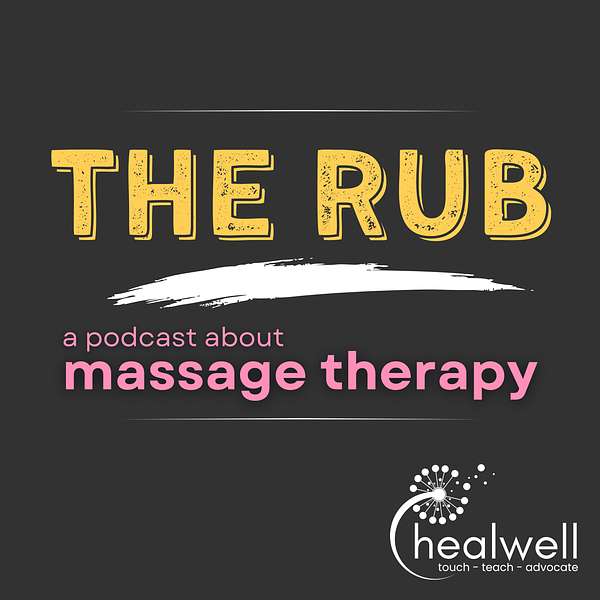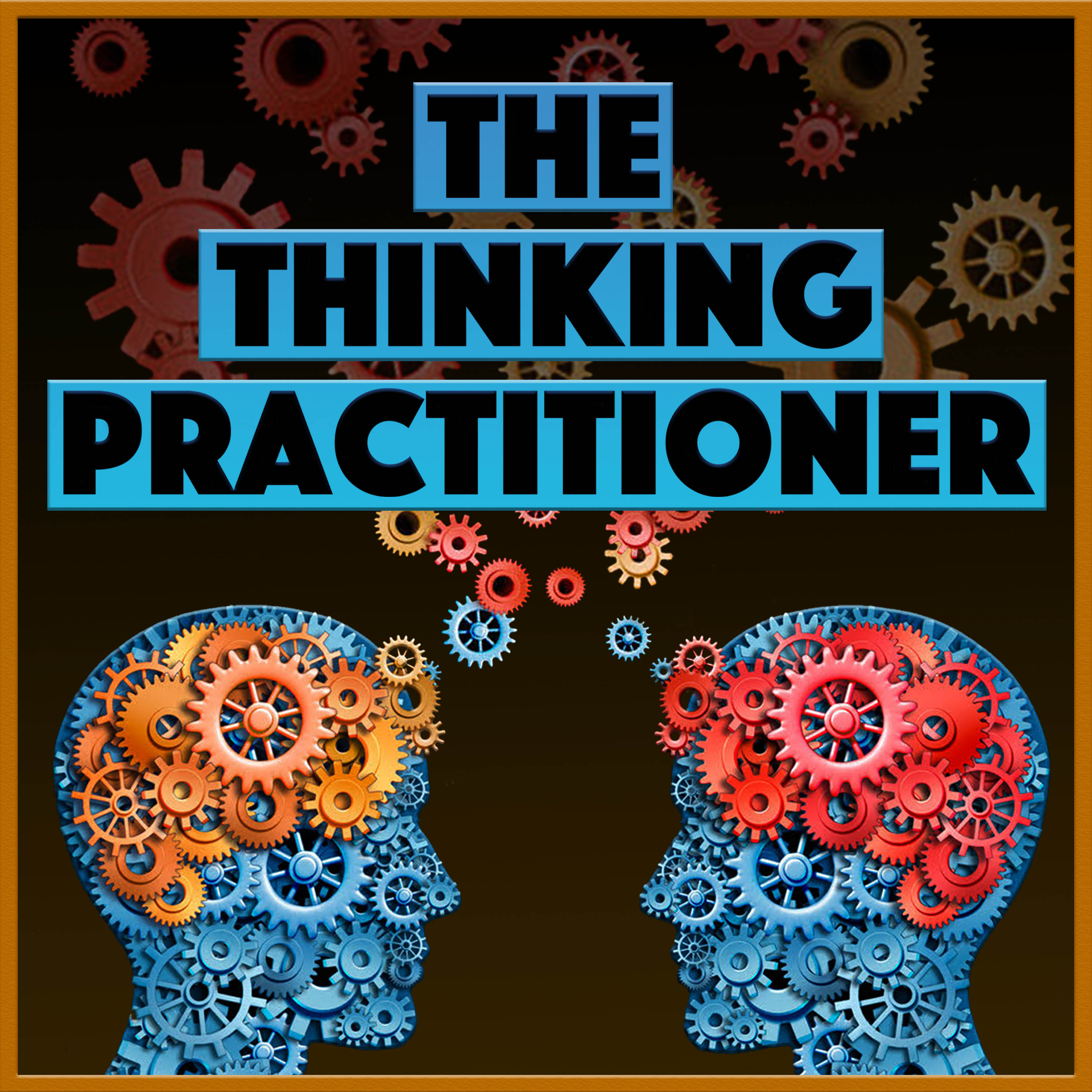
The Rub: a podcast about massage therapy
Join Healwell in examining and bringing context to the world of massage therapy beyond the table. We have ideas. We have opinions. We want change, and that will only come with an understanding of who and what massage therapy truly is. A variety of topics are up for grabs: history, philosophy, development, and all the other shiny things that fascinate us.
Healwell is a non-profit based out of the Washington DC area. Check us out at www.healwell.org
The Rub: a podcast about massage therapy
Editorial: First-Hand Mental Health Crisis
This episode contains a discussion about suicidal ideation. If you or someone you know is experiencing suicidal thoughts or crisis call or text 988 on your phone to reach the suicide hotline or click the lifeline link.
Healwell believes it is important to talk about the hard things. In this short episode, with an introduction by Cal Cates, Corey Rivera talks about their recent experience with suicidal ideation; what it is, what it isn't, and how to support yourself or someone else who may be experiencing it.
Call or Text 988
988 Lifeline Home Page
International Suicide Hotlines
For more information:
Ologies Podcast: Suicidology
NPR: Reach out and listen: How to help someone at risk of suicide
Toxic Positivity and Mental Health | When Does Optimism Become Toxic?
Suicide Prevention Resource Center
Suicide Prevention Resource for Action
2024 National Strategy for Suicide Prevention
Subscribe to our Substack: "More Than Hands"
Send us an email: podcast@healwell.org
Leave us a voice message: 703-468-1799
Check out our interview-style podcast: Interdisciplinary
You can support Healwell and the cool things we make by donating here!
Ways join in:
- Leave us a review on Apple Podcasts
- Check out Healwell’s live and online classes
- Continue the conversation with a free 3-day trial of the Healwell Community
- Find a copy of Rebecca Sturgeon's book: "Oncology Massage: An Integrative Approach to Cancer Care"
Thank you to ABMP and AMTA for sponsoring us!
Healwell is a 501(c)(3) non-profit based out of the Washington DC area. Check us out at www.healwell.org
This episode contains a discussion about suicide. If you or someone you know is experiencing suicidal thoughts or a crisis, call or text 988 on your phone to reach the suicide hotline, or click the Lifeline link in the show notes. At HealWell, we thrive on community. We love to build it, we love to be a part of it, we love to facilitate its nourishment and to watch it grow, and we continue to be relevant because of it. The episode you're about to listen to is important. I mean they're all important, but this one is for every single person, in a way that some of our more nerdy or wonky episodes may not be episodes may not be. It's an invitation to rest, to listen and to consider deeply the impact of recent events on our fellow humans and on ourselves. Regardless of how you voted, I invite you to consider that there are likely people around you who are experiencing suicidal ideation and, yes, perhaps you are that person. Perhaps that suicidal ideation is related to the election results, perhaps it isn't.
Speaker 1:Suicide rarely has a single cause. Suicide is not new and it is not a partisan issue. It's a human issue, and that's what Heal Well cares about Humans. Even in times that are not rife with political upheaval, suicide is a leading cause of death and affects people of all ages. This episode is specifically about suicidal ideation how to be supportive to others and how to care for yourself. According to the CDC, over 49,000 people died by suicide in 2022, the most recent year for which there is aggregated data. That is one death every 11 minutes. Meanwhile, about 13 million people thought seriously about suicide, about 4 million of those made a plan to end their lives and 1.6 million attempted suicide. That's a lot of people who feel, or have felt, like it might be better to not be alive. I hope you'll take seven minutes to listen, to feel and to consider how we can all contribute to community that fosters safety and connection. Community is the first line of defense. Someday, it may save your life.
Speaker 2:Welcome to the Rub, a podcast that's usually about massage therapy. I'm your host, kori Rivera, and in today's episode we're going to talk about suicidal ideation. I wanted to give you an episode about massage robots, and I will. I wanted to give you an episode about massage robots, and I will. We recorded it the day after the election, so I'm still trying to figure out if it's listenable, but it should be released by the end of the year. However, instead, today we're going to talk about something more immediate to this moment.
Speaker 2:I have been having suicidal thoughts since the election results were called, and I know that I am not alone. I know because I've spoken to other people, and every time I do, they express shock, apprehension and then a strange sense of relief, as though someone saying it out loud popped a bubble. So here is a story about my experience with suicidal ideation, which is when someone has thoughts about death by suicide. As I've mentioned on this podcast before, I have bipolar disorder. Daylight savings a ridiculous choice that messes with my disorder at the best of times happened right before the election. It was a double whammy to my nervous system that has become difficult to recover from. Suicidal ideation is not a new experience for me, my family runs the gauntlet of mental illness, so attempts and hospitalizations are something I grew up with. While this is sad, it means I don't have any taboos about discussing suicide or mental illness. You do not need a diagnosed mental illness to have ideation. You simply need to be a human. Having thoughts of suicide do not make you weak, stupid or broken in some way. I know, because I am none of those things, although, to be fair, sometimes I can't find my pencil because I put it behind my ear. So it's not as though I'm a perfect specimen either.
Speaker 2:Here are the answers to questions people have asked me recently. Has this happened before? Yes, I have had suicidal ideation in the past, particularly when I was 19, before I got my diagnosis and I couldn't figure out why I was suddenly failing at everything. What does it feel like? Since all ideation happens inside of our heads, it can be difficult to compare. For me, it comes down to two repeating sentences. The first is it would be better if it was just over, and the second is no way out. While ideation is not funny. I would like you to know that. The no way out. While ideation is not funny. I would like you to know that the no way out always sounds like Matthew Broderick from the Producers, which is a weird choice that my brain has made. You should notice that neither of those sentences mean I want to die. I don't want to die, I just sometimes don't want to live. You could call that splitting hairs, but they really are different things.
Speaker 2:Both phrases are what are considered intrusive thoughts. Because our thoughts come from our brains, we are predisposed to assume that they are the truth, but they are often random. Intrusive thoughts are uninvited and unwanted. They are not intuition. They do not hold the secrets to the universe. They don't even hold the secrets to you. Another question I hear is what can I do for you? Believe me. Believe anyone who tells you they are considering suicide, even if it is only a vague thought in their mind. Take them seriously. There will be all the time in the world to figure out if they weren't telling the truth or they were trying to manipulate you, which they probably weren't. They weren't telling the truth or they were trying to manipulate you, which they probably weren't.
Speaker 2:This time I had to reach out to several people before someone realized I was serious, probably because I tend to deliver distressing information very calmly, because my sympathetic system leans hard into the freeze response. Do not ever try to brightside someone out of their feelings. Phrases like you'll feel better later or just go take a walk, or you don't mean that or everything has a reason indicate that you are not a safe person to talk to and can make the person struggling with ideation stop communicating. The other thing that you can do for me is not panic. The last thing I need is to have to manage your emotions when I can barely manage my own. Stay calm. Ask questions, questions like do you have a plan? If the answer is yes, think about how you can help stop the plan. The decision to take a suicidal action can happen in less than 10 minutes, so putting roadblocks in front of a plan is imperative. Pain is awful, but the emotions are not what hurts someone. Action is what will hurt them. Preventing the action is the number one priority. Here are the steps I took this week.
Speaker 2:I work from home, so I asked my husband to take my medications. To work with him. I instituted check-ins every hour with my family, my husband and anyone from the Hewell community who felt they needed one. The check-ins were not really for them, they were for me. When my phone timer dinged once an hour, I could tell myself that I'd made it and I would be able to make it to the next timer. When the feelings became too overwhelming, I drove 45 minutes to my brother's house and sat on his couch while some ignorable comfort TV played until it was time for my husband to leave work and I could go home. I take all my medications as prescribed and I do not hesitate to take my anxiety rescue medication. I sleep under a weighted blanket every night. I contacted my psychiatrist and spoke to them about adjusting my dosages. I made tiramisu or something resembling it.
Speaker 2:If you are feeling suicidal, tell someone. If they don't believe you, tell someone else. If the feelings get overwhelming, don't be alone. Go sit in a library or a grocery store or a lively park. Distraction can be helpful, but sometimes nothing is distracting enough. Grounding exercises can be helpful, but sometimes they don't work. Keep trying. If you're having a hard time eating, try to drink water. Broth and sports drinks can be useful in between options. Remember you have one goal and it is not to take the action. As of this recording, it has been a week. The feeling isn't gone, but it also isn't as constant. Sometimes I have completely normal feelings, like being annoyed that I can't find the pencil I was just holding, or enjoying pictures of hedgehogs, but sometimes one of those intrusive thoughts comes back like a wave slapping my face. It's a little bit better every day.
Speaker 2:I think talking about suicide is important because we aren't very good at talking about the hard things, but this is a hard thing that is easy for me to discuss. So here we are. I hope you can take the information from my experience and use it to help you and the people around you. I don't know what the solution to any of this mess is, but among the post-election noise, there is one message that has stood out to me Build community, and build it right now. Make bonds, find compatriots, join groups, find causes. You do not have to make something from scratch. In fact, don't instead follow the lead of people who are already doing the work? You do not have to do this alone. Please do not try to do this alone. You are loved, you are important. You are not alone. Thank you for listening.
Podcasts we love
Check out these other fine podcasts recommended by us, not an algorithm.

Interdisciplinary
Healwell
Maintenance Phase
Aubrey Gordon & Michael Hobbes
You're Wrong About
Sarah Marshall
The Rest Room
Natasha Lipman
The ABMP Podcast | Speaking With the Massage & Bodywork Profession
Associated Bodywork & Massage Professionals
Research Perch
Massage Therapy Foundation
Unexplainable
Vox
The Words Matter Podcast with Oliver Thomson
Oliver Thomson
The Thinking Practitioner
Til Luchau & Whitney Lowe
Collaborative Connections Podcast | Conversations on Cancer Care for Oncology Massage Therapists & Estheticians
Society for Oncology Massage & Esthetics

